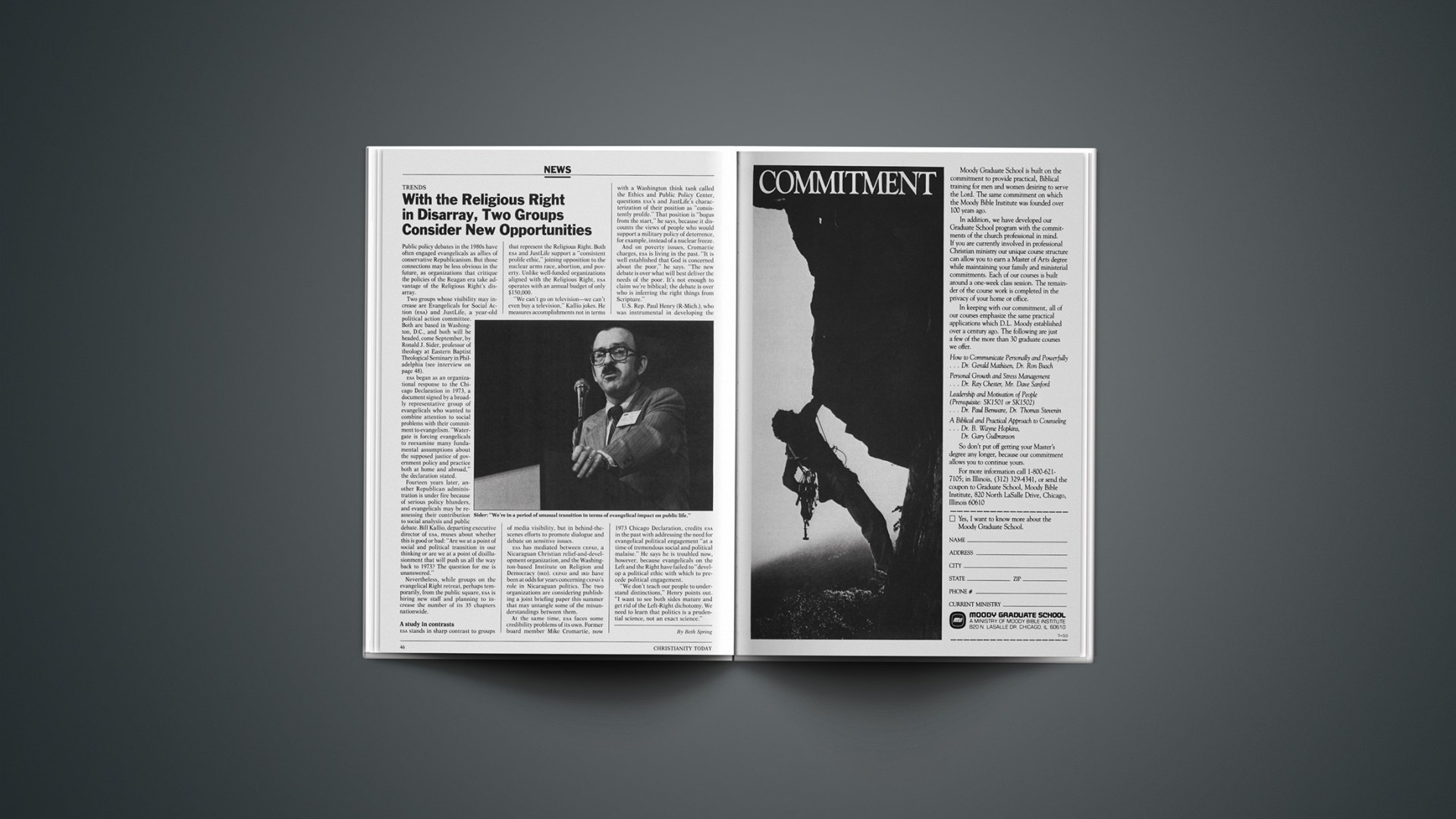Public policy debates in the 1980s have often engaged evangelicals as allies of conservative Republicanism. But those connections may be less obvious in the future, as organizations that critique the policies of the Reagan era take advantage of the Religious Right’s disarray.
Two groups whose visibility may increase are Evangelicals for Social Action (ESA) and JustLife, a year-old political action committee. Both are based in Washington, D.C., and both will be headed, come September, by Ronald J. Sider, professor of theology at Eastern Baptist Theological Seminary in Philadelphia (see interview on page 48).
ESA began as an organizational response to the Chicago Declaration in 1973, a document signed by a broadly representative group of evangelicals who wanted to combine attention to social problems with their commitment to evangelism. “Watergate is forcing evangelicals to reexamine many fundamental assumptions about the supposed justice of government policy and practice both at home and abroad,” the declaration stated.
Fourteen years later, another Republican administration is under fire because of serious policy blunders, and evangelicals may be reassessing their contribution to social analysis and public debate. Bill Kallio, departing executive director of ESA, muses about whether this is good or bad: “Are we at a point of social and political transition in our thinking or are we at a point of disillusionment that will push us all the way back to 1973? The question for me is unanswered.”
Nevertheless, while groups on the evangelical Right retreat, perhaps temporarily, from the public square, ESA is hiring new staff and planning to increase the number of its 35 chapters nationwide.
A Study In Contrasts
ESA stands in sharp contrast to groups that represent the Religious Right. Both ESA and JustLife support a “consistent prolife ethic,” joining opposition to the nuclear arms race, abortion, and poverty. Unlike well-funded organizations aligned with the Religious Right, ESA operates with an annual budget of only $150,000.
“We can’t go on television—we can’t even buy a television,” Kallio jokes. He measures accomplishments not in terms of media visibility, but in behind-the-scenes efforts to promote dialogue and debate on sensitive issues.
ESA has mediated between CEPAD, a Nicaraguan Christian relief-and-development organization, and the Washington-based Institute on Religion and Democracy (IRD). CEPAD and IRD have been at odds for years concerning CEPAD’s role in Nicaraguan politics. The two organizations are considering publishing a joint briefing paper this summer that may untangle some of the misunderstandings between them.
At the same time, ESA faces some credibility problems of its own. Former board member Mike Cromartie, now with a Washington think tank called the Ethics and Public Policy Center, questions ESA’s and JustLife’s characterization of their position as “consistently prolife.” That position is “bogus from the start,” he says, because it discounts the views of people who would support a military policy of deterrence, for example, instead of a nuclear freeze.
And on poverty issues, Cromartie charges, ESA is living in the past. “It is well established that God is concerned about the poor,” he says. “The new debate is over what will best deliver the needs of the poor. It’s not enough to claim we’re biblical; the debate is over who is inferring the right things from Scripture.”
U.S. Rep. Paul Henry (R-Mich.), who was instrumental in developing the 1973 Chicago Declaration, credits ESA in the past with addressing the need for evangelical political engagement “at a time of tremendous social and political malaise.” He says he is troubled now, however, because evangelicals on the Left and the Right have failed to “develop a political ethic with which to precede political engagement.
“We don’t teach our people to understand distinctions,” Henry points out. “I want to see both sides mature and get rid of the Left-Right dichotomy. We need to learn that politics is a prudential science, not an exact science.”
By Beth Spring










